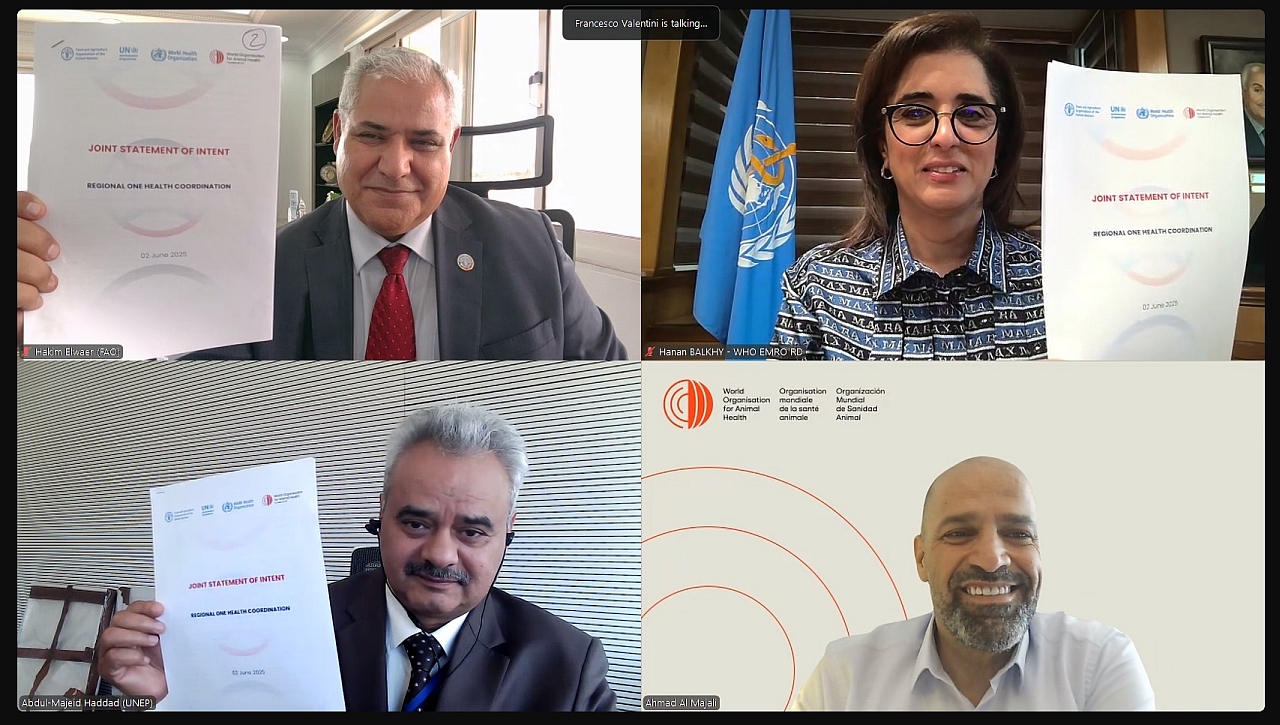Regional leaders unite to strengthen One Health approach in historic agreement
3f75510a-0646-416f-9603-f917c1e06323.png?sfvrsn=71805fe1_2)
©FAO
In a landmark move to address interconnected health threats, the Food and Agriculture Organization of the United Nations (FAO), United Nations Environment Programme (UNEP), World Health Organization (WHO), and World Organization for Animal Health (WOAH) have joined forces to advance the One Health approach across the Middle and Near East, North Africa, and Eastern Mediterranean regions. The partnership, formalized through a new Regional One Health Coordination Mechanism and Action Plan, marks a significant step forward in tackling zoonotic diseases, antimicrobial resistance, and environmental degradation through collaborative, cross-sectoral strategies.
A transformative collaboration for regional health security
The newly established framework represents a paradigm shift in how the region addresses complex health challenges at the human-animal-environment interface. By institutionalizing cooperation between sectors, the Quadripartite organizations are creating durable structures for prevention, preparedness and response.

"This agreement represents our collective commitment to move beyond and implement practical solutions that will reshape our region's health landscape," said FAO Assistant Director-General (ADG) AbdulHakim Elwaer. "Through this mechanism, we are embedding One Health principles into the very fabric of regional health governance - from high-level policy-making to field implementation, from urban centers to rural communities. This is not merely about preventing outbreaks; it's about building resilient food systems, safeguarding farmer livelihoods, and creating sustainable ecosystems where people, animals and the environment can thrive together."
The Regional Quadripartite One Health Coordination Mechanism establishes rotating leadership among the partner agencies, with FAO assuming the inaugural chairmanship. This innovative governance model ensures shared ownership while leveraging each organization's comparative advantages. The accompanying Regional Quadripartite One Health Action Plan 2025–2027 provides a detailed roadmap for strengthening surveillance systems, building technical capacity, and mobilizing resources across the region.
Addressing persistent challenges through unified action
While individual countries have made progress in adopting One Health approaches, fragmented systems and competing priorities have limited their effectiveness. The new framework directly tackles these obstacles through:
- Integrated governance: Permanent technical working groups will bridge human health, agriculture, and environmental sectors
- Joint planning: Development of unified protocols for disease surveillance and outbreak response
- Capacity strengthening: Comprehensive training programs for professionals across disciplines
- Knowledge sharing: Regional platforms for exchanging best practices and innovations
"The strength of this initiative lies in its recognition that environmental health is not separate from human and animal well-being - it is the foundation," emphasized UNEP Regional Director Sami Dimassi. "By addressing ecosystem degradation and climate impacts alongside health systems, we are treating the root causes of emerging diseases rather than just the symptoms."
The agreement comes at a critical juncture, as the region faces growing pressures from climate change, population growth, and evolving disease threats. Recent zoonotic outbreaks and escalating antimicrobial resistance have underscored the urgent need for coordinated action.
From commitment to implementation: The path ahead
With the formal agreement now in place, the Quadripartite partners are shifting focus to implementation. Key priorities for the coming period include:
- Operationalizing the Coordination Mechanism through regular technical meetings and joint planning sessions
- Developing integrated surveillance systems that connect veterinary, public health, and environmental monitoring networks
- Mobilizing resources through innovative financing mechanisms and partnership development
- Engaging communities as active participants in One Health initiatives
"The action plan will help strengthen cooperation between the four international agencies to sustainably balance and optimize the health of humans, animals and the environment in our Region, stated WHO Regional Director Dr. Hanan Balkhy. With 18 of 22 countries having reported emerging zoonotic diseases in recent years, and with millions affected annually by foodborne illness and antimicrobial resistance, the urgency of One Health implementation could not be clearer.
The partners emphasized that success will require sustained commitment at all levels - from political leadership to frontline practitioners. Regular progress reviews and adaptive management will ensure the initiative remains responsive to emerging needs and challenges.
A model for global health security
As the first region to establish such a comprehensive Quadripartite mechanism, the Middle and Near East, North Africa, and Eastern Mediterranean are positioning themselves as pioneers in integrated health governance.
"What we are building here today will serve as a blueprint for other regions facing similar challenges," noted WOAH's Dr. Ahmed Al Majali. "By demonstrating that collaboration across sectors is not only possible but practical, we are redefining what effective health security looks like in an interconnected world."
The initiative aligns with global efforts to strengthen pandemic preparedness and responds directly to recommendations in the new Pandemic Agreement. Its emphasis on prevention, early warning, and cross-sectoral coordination reflects evolving best practices in global health security.
A call to action
As implementation begins, the Quadripartite partners are calling on governments, development agencies, research institutions, and civil society to join forces in making the One Health approach a reality across the region.
“While today's signing marks a critical milestone, our real work begins now," concluded FAO's Elwaer. "True success will come when every farmer embraces their role as a guardian of ecosystem health, when health workers bridge the human-animal divide daily, when policymakers consistently champion cross-sectoral solutions, and when all communities recognize our shared destiny with the natural world. This is our collective call to action - to transform these commitments into tangible protections that safeguard not just our region's health today, but its vitality for generations to come”.
With strong leadership, sustained investment, and collective action, this initiative has the potential to transform regional health security and create a safer, more resilient future for generations to come.
Contact
NENA Office Communications (+20) 2 3331 6000 [email protected]
